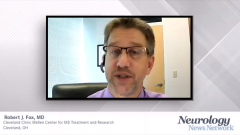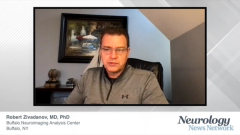
Grading High-Potential Remyelinating Agents for Multiple Sclerosis
A multiple sclerosis expert gives insight on which types of investigational agents may be able to repair neurodegeneration lost from disease progression.
Episodes in this series

Transcript below.
Robert Zivadinov, MD, PhD: The amyloid [agents] would be the most tissue specific. If you want to bind the myelin, these agents would be more specific in binding the myelin than MTR (magnetization transfer ratio) or myelin water fraction, or even G ratio, for example. It also has been proposed that there should be a combination of both MTR and PET to further increase the specificity. PET is great, but it’s extremely expensive and even more expensive than MRI. Also, the tracers are much more logistically challenging to be delivered, as well they are 30 to 40 times more expensive than the contrast agent we use for MRI.
A subset of patients in these trials may, or should, have a PET scan. The MTRs are more globally available, can also be done on older scanners, and have been largely standardized over the years. As for what I presented, this story started in the mid-2000s. Now, 15 years later, we have many trials that use the MTI. These are much more affordable, can be done on a whole sample of patients in a trial that is remyelination oriented, and have been robustly reconfirmed over and over to be represented in a larger portion of patients.
I’m for both. Everybody should try to whenever they can get at least the MTI, but also try to get the G ratio in those sites that are equipped to do that. Let’s add a PET component in the subpopulation of a big trial to further demonstrate that it is remyelination happening in these patients.
The other problem is that the drugs that have been studied so far have shown very little signal change in terms of remyelination. Even in that visually evoked potential study with opicinumab [anti-LINGO-1 or BIIB033; Biogen], the results were borderline and eventually led to the discontinuation of the whole program. Before we start these multimillion-dollar trials, we need to be sure that some of the drugs have more remyelinating potential.
Newsletter
Keep your finger on the pulse of neurology—subscribe to NeurologyLive for expert interviews, new data, and breakthrough treatment updates.














